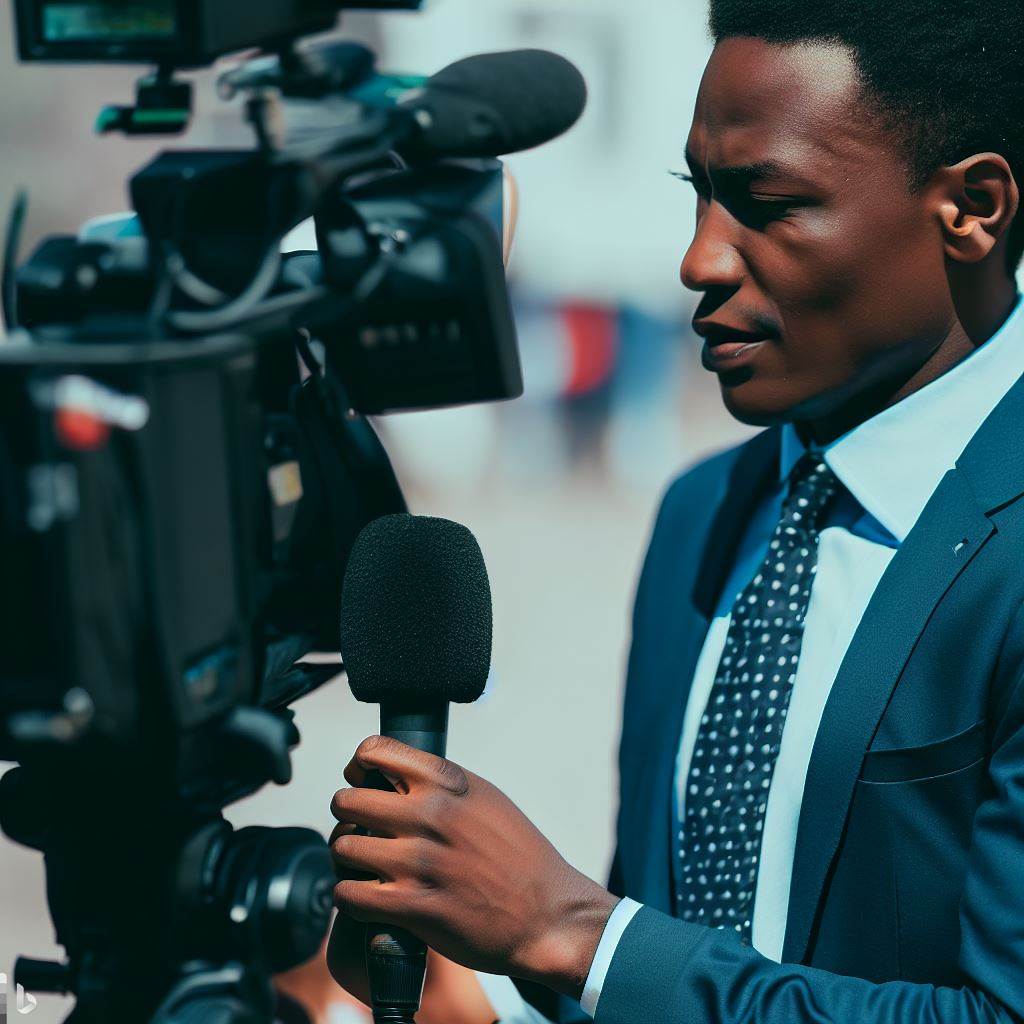Challenges Faced by TV Reporters in Nigeria
Last Updated on August 28, 2023
Introduction
TV reporting in Nigeria is a challenging profession that is faced with numerous obstacles.
From political interference to security risks, TV reporters constantly navigate a hostile environment in the pursuit of balanced and accurate news coverage.
These challenges are not only detrimental to the journalists themselves but also affect the quality of news delivered to the Nigerian audience.
It is crucial to understand the difficulties faced by TV reporters in Nigeria in order to appreciate their resilience and dedication to their profession.
In a country where freedom of the press is often under threat, TV reporters in Nigeria are confronted with the daunting task of reporting on contentious issues while maintaining their impartiality.
The Nigerian government’s influence and control over media outlets often result in censorship, self-censorship, and the suppression of opposing views.
This stifling atmosphere has a direct impact on the ability of TV reporters to freely express themselves and provide unbiased news to the Nigerian public.
Moreover, TV reporters in Nigeria face constant security risks while carrying out their work.
Journalists who dare to expose corruption, injustice, or human rights abuses are often targeted by powerful individuals or groups who seek to silence them.
This creates a climate of fear and intimidation, forcing many reporters to think twice before investigating and reporting on sensitive issues.
Limited funding and outdated equipment hamper their ability to deliver accurate and timely news.
This hinders their capacity to compete with international news agencies and limits their reach in disseminating essential information to a wider audience.
Despite these challenges, TV reporters in Nigeria remain dedicated to their profession, determined to provide the Nigerian public with unbiased and informative news.
Their bravery and commitment inspire hope for a more transparent and vibrant media landscape in the country.
Lack of Press Freedom
Limitations on freedom of the press in Nigeria
Press freedom is essential for the functioning of a democratic society, but in Nigeria, there are significant limitations on this fundamental right.
These limitations have a profound impact on TV reporters, restricting their ability to report freely and without fear.
Let’s explore these restrictions and examine how they affect the work of TV reporters.
1. Legal Restrictions
Nigeria has several laws that hinder press freedom, such as the Criminal Code Act and the Official Secrets Act.
These laws provide a basis for the government to suppress dissent and control the media.
2. Threats and Violence
TV reporters face physical threats and violence as a result of their work in Nigeria. They risk attacks from government officials, security forces, and even criminal organizations.
Such dangers discourage them from pursuing investigative reporting or exposing corruption.
3. Self-Censorship
Due to the fear of retribution, many TV reporters in Nigeria resort to self-censorship. They avoid covering sensitive topics or criticizing powerful individuals or institutions.
This compromises their journalistic integrity and prevents them from holding the government accountable.
4. Media Regulation
The Nigerian government exerts control over the media through regulatory bodies like the National Broadcasting Commission (NBC).
This allows the government to dictate content, impede investigative reporting, and suppress dissenting voices.
5. Harassment and Intimidation
TV reporters often face harassment and intimidation by government officials or security forces, such as arbitrary arrests, interrogations, or even detention.
These tactics are used to silence journalists and discourage them from exposing corruption or human rights abuses.
6. Shutdowns and Suspensions
The government in Nigeria has a history of shutting down TV stations or suspending their licenses.
This tactic is commonly employed to stifle critical voices and limit media coverage during sensitive times, such as elections or protests.
7. Lack of Access to Information
TV reporters frequently encounter difficulties in accessing information from government sources.
For example, officials often withhold vital information or deny interviews, hindering the ability of reporters to accurately inform the public.
8. Attacks on Journalists
There have been instances where TV reporters and journalists have been attacked or killed for their work.
One notable example is the murder of Dele Giwa, an investigative journalist, in 1986. Such incidents create a climate of fear and have a chilling effect on freedom of the press.
9. Restrictive Media Laws
Nigeria’s media laws, such as the Nigeria Press Council Act and the Freedom of Information Act, contain provisions that limit press freedom.
These laws give the government broad powers to control and regulate the media, thereby impeding the work of TV reporters.
10. Internet Censorship
The Nigerian government has also resorted to internet censorship, limiting access to information and hindering the ability of TV reporters to disseminate news.
In essence, TV reporters in Nigeria face significant limitations on press freedom, including legal restrictions, threats, self-censorship, and media regulations.
The hostile environment created by the government’s control of the media undermines the media’s role in a democracy.
It is crucial for the government to recognize the importance of press freedom and protect the rights of TV reporters.
Threats and Intimidation
TV reporters in Nigeria face many challenges. Major one: threats, intimidation.
This section: types of threats, impact on reporting, real-life examples.
1. Types of Threats and Intimidation
- Physical violence: TV reporters are often subjected to physical attacks while covering sensitive stories or reporting on protests and conflicts.
- Verbal abuse: Journalists regularly face verbal intimidation, including being insulted, harassed, or threatened with harm.
- Legal harassment: Some TV reporters are targeted with false legal charges or defamation lawsuits to silence their reporting.
- Online trolling: With the rise of social media, TV reporters are increasingly exposed to online threats, hate speech, and cyberbullying.
- Threats from political entities: Journalists who criticize or expose corrupt politicians often face threats from powerful entities.
2. Impact on Objective Reporting
The threats and intimidation faced by TV reporters in Nigeria significantly hinder their ability to report objectively.
The fear of physical harm or legal consequences often forces journalists to self-censor or avoid certain stories altogether.
This compromises the media’s role as a watchdog and undermines democracy.
Furthermore, the psychological toll of experiencing threats and intimidation can lead to heightened anxiety, stress, and trauma among TV reporters.
This, in turn, affects their mental well-being and job performance, as they constantly feel on edge and may become hesitant to tackle sensitive issues.
3. Real-Life Examples
Several real-life examples highlight the severity of threats faced by TV reporters in Nigeria:
- Dele Giwa: Giwa was a prominent Nigerian journalist who faced threats before his assassination in 1986. He received a mail bomb believed to be linked to his investigative reports.
- Umaru Isah: Isah, a TV reporter, was physically assaulted by unknown assailants in 2016 after he aired a story on corruption in the country.
- Ahmed Salkida: Salkida, a journalist known for his coverage of Boko Haram, received death threats for his fearless reporting on the terrorist group’s activities.
- Agba Jalingo: Jalingo, an investigative journalist, was detained for several months in 2019 on charges of treason for reporting on corruption allegations against a state governor.
These cases demonstrate the dangers journalists face and how threats and intimidation serve as tools to silence their critical voices.
Most importantly, TV reporters in Nigeria confront various forms of threats and intimidation that impede their ability to report objectively.
Physical violence, verbal abuse, legal harassment, online trolling, and threats from political entities all create a hostile environment for journalists.
The impact is evident in self-censorship, fear, and compromised mental well-being. Real-life examples further emphasize the need for better protection and support for journalists, ensuring their safety while upholding media freedom.
Read: Job Outlook for Television Reporters in Nigeria
Political Interference
In the Nigerian media landscape, political interference is a pervasive challenge faced by TV reporters.
This interference undermines the principles of independent journalism, hampering the quality, objectivity, and accuracy of news reporting.
1. Impact of Political Pressure on News Quality
Political pressure exerts a significant influence on the quality of news in Nigeria.
Despite press freedom, pols often manipulate media to advance, suppress.
TV reporters face huge challenges in unbiased reporting, truth.
They encounter pressure from politicians who attempt to control the narrative and shape public opinion in their favor.
Examples of Political Pressure on TV Reporters
- Censorship: Politicians have been known to censor TV reporters by dictating what can and cannot be reported, especially on sensitive topics that may criticize government actions or reveal corruption.
- Threats and Intimidation: Some political figures resort to intimidation tactics, including threats of physical harm, to silence TV reporters who dig deep into corruption scandals or expose government wrongdoing.
- Bribes and Financial Control: Financial control is another tool utilized by politicians to manipulate TV reporting. By exerting influence over media owners through financial means, politicians can dictate the content and tone of news coverage.
2. Detrimental Effects on Accuracy and Accountability
The interference of political figures poses a grave threat to the accuracy and accountability of news reporting in Nigeria.
When reporters are subjected to intimidation or censorship, the public is deprived of accurate information necessary for making informed decisions.
Political interference distorts the truth, promotes propaganda, and undermines the credibility of TV journalism.
It erodes the trust between reporters and the audience, leading to skepticism and disbelief in the news.
Noteworthy Cases of Reporter Influence and Censorship
- Case 1: In 2019, a TV reporter investigating corruption among high-ranking government officials was arrested on trumped-up charges and detained to prevent the release of damning evidence.
- Case 2: A prominent news anchor was forced to retract a story exposing a politician’s embezzlement due to pressure from the politician’s influential connections within the media industry.
- Case 3: During election periods, TV reporters often face restrictions on covering opposition candidates or highlighting election irregularities, under pressure from ruling political parties.
Political interference remains a pervasive challenge for TV reporters in Nigeria, impeding their ability to deliver objective and accurate news to the public.
Censorship, threats, and financial control hinder the quality of reporting and compromise the media’s role as a watchdog.
It is crucial for the Nigerian government to enforce and uphold press freedom, ensuring that journalists are protected from political interference.
Only by safeguarding independent reporting can the media serve its purpose as a crucial pillar of democracy, holding power accountable and fostering an informed citizenry.
Read: The Career Path of Nigerian Television Journalists
Inadequate Resources and Infrastructure
TV reporters in Nigeria confront formidable challenges due to inadequate resources and infrastructure, significantly impeding their news gathering and reporting capabilities, thus compromising information quality.
Foremost among these challenges is the dearth of resources. Scarce funding plagues many news outlets, directly affecting reporter equipment and technology access.
This lack impedes effective news capture and transmission.
Additionally, obsolete technology compounds these issues. Outdated, unreliable equipment hampers real-time reporting, impacting information timeliness.
In today’s rapid news cycle, cutting-edge technology is vital for accurate and competitive reporting.
Limited resources’ impact is evident during critical events. In major crises, such as natural disasters, reporters often lack live coverage capabilities due to insufficient resources.
Coverage in remote areas suffers due to insufficient equipment and transportation, hindering reliable sources, investigations, and information verification. This jeopardizes credibility and fosters misinformation.
In fact, inadequate resources and infrastructure hinder Nigerian TV reporters’ ability to gather and report news effectively.
Urgent investment is crucial to empower reporters, and ensure the public receives reliable information in a timely manner.
Read: The Evolution of Television Editing in Nigeria

Lack of Job Security
TV reporters in Nigeria face numerous challenges in their profession, and one of the most significant is the lack of job security.
The nature of their work is precarious, leaving them vulnerable to instability and uncertainty.
1. Contract-based Work
TV reporters often work on a contract basis, which means their employment is temporary and subject to renewal.
This setup contributes to job insecurity, as termination remains a possibility without advance notice for these individuals.
2. High Turnover
The media industry in Nigeria has a high turnover rate, leading to frequent layoffs and dismissals. TV reporters constantly live under the fear of losing their jobs, as they are easily replaceable.
3. Financial constraints
Many media organizations in Nigeria face financial difficulties, which further exacerbate the lack of job security for TV reporters.
Budget cuts and downsizing lead to job losses, leaving reporters in a constant state of uncertainty.
4. Political Interference
Job security of TV reporters can be jeopardized by political interference, leading to potential dismissals and censorship when conflicting with governmental or powerful interests.
Examples
- A prominent TV reporter in Nigeria was abruptly fired after uncovering corruption within a government ministry. This incident highlights the vulnerability of journalists when reporting on sensitive issues.
- Several TV reporters lost their jobs during the 2019 general elections in Nigeria. Some were terminated for allegedly biased reporting, while others faced threats and intimidation from political parties.
- A TV reporter who exposed a fraudulent business operation faced retaliation from influential individuals, leading to her termination. This case exemplifies the risks reporters take in pursuing investigative journalism.
- Due to financial constraints, a popular TV station laid off a significant number of reporters, leaving them unemployed and uncertain about their future in the media industry.
In short, TV reporters in Nigeria face a lack of job security, which adds to the challenges they encounter in their profession.
Contract-based work, high turnover, financial constraints, and political interference are all factors that contribute to their precarious job situation.
The examples provided underscore the real-life consequences of this issue, highlighting the need for better protection and support for journalists in Nigeria.
Read: Challenges Faced by Television Editors in Nigeria
Ethical Dilemmas
TV reporters in Nigeria face numerous ethical dilemmas.
However, they are often caught between the responsibility of reporting truthfully and the challenge of gaining access to information.
Let’s delve into some of the conflicts they encounter.
1. Balancing Truth and Access
One major ethical dilemma faced by TV reporters is the constant struggle to report truthfully while also gaining access to sensitive information.
Journalists have a duty to uncover and expose the truth, but they often face obstacles when trying to access certain sources or documents.
This conflict arises when reporters need to maintain relationships with government officials, business leaders, or other influential individuals who may grant them exclusive access to information.
However, this access may come at the cost of presenting a full and unbiased picture to the public.
2. Pressure from Political Influence
TV reporters in Nigeria are frequently pressured by political entities or individuals who seek to manipulate the news in their favor.
This poses a significant ethical challenge because journalists must resist such pressures and report objectively.
Political interference can range from subtle attempts to control the narrative to blatant censorship.
Reporters often find themselves in precarious situations where their integrity is tested, and they must navigate these ethical minefields in order to maintain their credibility.
3. Reporting on Sensitive Topics
Another ethical challenge faced by TV reporters is reporting on sensitive topics, such as corruption, human rights abuses, or religious conflicts.
These topics often involve powerful individuals or organizations who may try to suppress the truth.
In such cases, TV reporters must choose between exposing the truth while also considering the risks to their personal safety and the potential backlash from those with vested interests.
This requires careful consideration of ethical obligations and the potential consequences of reporting on sensitive issues.
Examples of Ethical Challenges
To illustrate the ethical challenges TV reporters in Nigeria face, let’s examine a few real-life examples:
- Bribery and Corruption: A TV reporter uncovers evidence of widespread government corruption but faces pressure to bury the story in exchange for a hefty bribe.
- Conflict of Interest: A reporter has close ties to a company involved in a controversial project but is assigned to cover the topic objectively.
- Violence and Threats: While investigating a local gang, a journalist receives threats and must decide whether to continue pursuing the story or prioritize personal safety.
- Censorship: A TV station owner censors a story criticizing the government to maintain a favorable relationship, compromising the principle of free and unbiased reporting.
- Anonymous Sources: A reporter receives sensitive information from an anonymous source but must weigh the value of the information against the trustworthiness and potential motives of the source.
In the end, TV reporters in Nigeria face significant ethical dilemmas as they strive to uncover the truth while navigating the challenges of gaining access to information.
Balancing truth and access, resisting political influence, and reporting on sensitive topics are common ethical challenges they encounter.
To maintain their integrity, journalists must make difficult decisions and uphold their ethical obligations despite the pressures they face.
Conclusion
TV reporters in Nigeria face numerous challenges in their line of work. These challenges include censorship, lack of access to information, harassment, and violence.
It is essential to overcome these obstacles for a free and independent press in the country.
The importance of overcoming these challenges cannot be overstated. A free press is vital for the functioning of a democratic society.
It ensures transparency, accountability, and the protection of citizens’ rights. By addressing these challenges, Nigeria can strengthen its democracy.
In light of this, it is crucial for individuals and organizations to take action to promote press freedom and support journalists in Nigeria.
This can be done by advocating for policy reforms that protect journalists’ rights, condemning censorship, and providing resources and training to journalists.
It is also important for international bodies and governments to put pressure on Nigeria to uphold press freedom and protect journalists.
This can be achieved through diplomatic channels, economic incentives, and raising awareness of the challenges faced by journalists in the country.
In summary, a free and independent press is essential for a thriving democracy.
By recognizing the challenges faced by TV reporters in Nigeria and taking action, we can work towards a society that values and supports press freedom, ultimately benefiting the entire nation.


